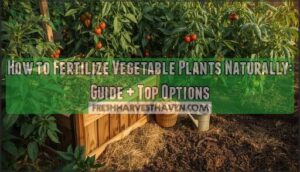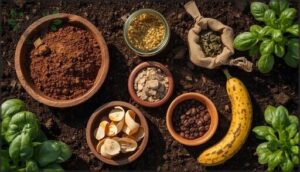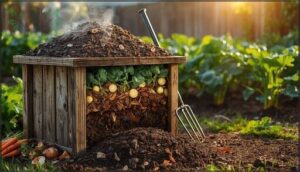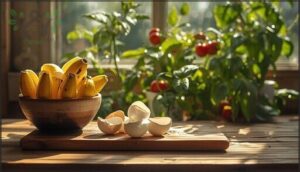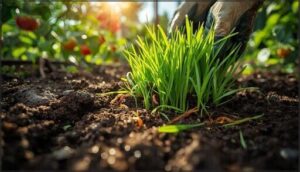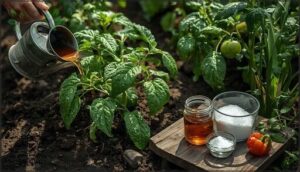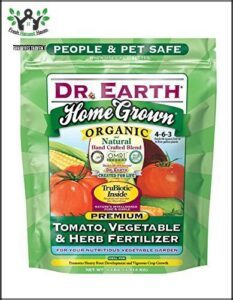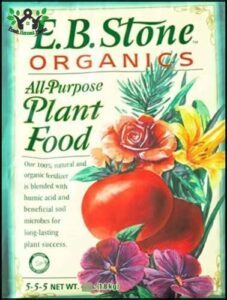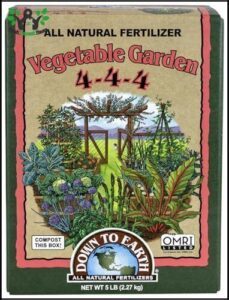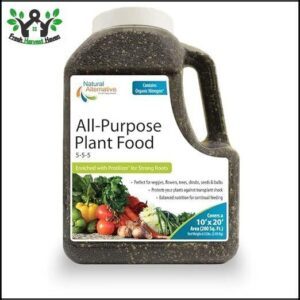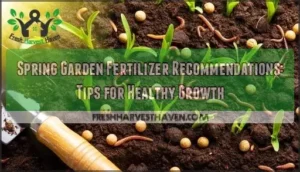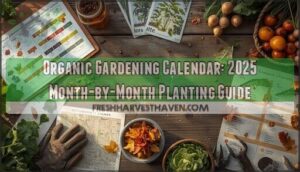This site is supported by our readers. We may earn a commission, at no cost to you, if you purchase through links.
Your tomato plants are wilting despite regular watering, and those pepper leaves are turning an odd shade of yellow. The culprit? Depleted soil that’s run out of the nutrients your vegetables need to thrive. Most gardeners reach for synthetic fertilizers at this point, but those chemical shortcuts often harm the very soil ecosystem that bolsters healthy plant growth.
Fertilizing vegetable plants naturally works with nature instead of against it, feeding beneficial microbes and building long-term soil fertility rather than just delivering a quick nutrient fix. When you use compost, manure teas, or even kitchen scraps like banana peels, you’re creating a living soil that sustains your garden season after season.
The approach takes a bit more planning than grabbing a bottle off the shelf, but the payoff shows up in stronger plants, better harvests, and vegetables that actually taste like they should.
Table Of Contents
- Key Takeaways
- Benefits of Fertilizing Vegetable Plants Naturally
- Types of Natural Fertilizers for Vegetables
- How to Make and Use Homemade Fertilizers
- Application Tips for Natural Fertilizers
- Top Natural Fertilizers for Vegetable Plants
- Frequently Asked Questions (FAQs)
- What are examples of natural and homemade plant fertilizers?
- What are the best natural fertilizers for vegetable gardens?
- Can you make natural fertilizers at home?
- Should you use natural fertilizers for homegrown vegetables?
- How do you make a natural fertilizer?
- What is a natural fertilizer?
- What is the best homemade fertilizer for vegetables?
- Are coffee grounds and cinnamon good for plants?
- How to fertilize soil naturally for vegetables?
- How do you fertilize a garden?
- Conclusion
Key Takeaways
- Natural fertilizers like compost, manure tea, and kitchen scraps build living soil ecosystems that boost microbial populations by up to 74% and increase vegetable yields by 7.6–45.2% while cutting fertilizer costs by 30-40%.
- Organic amendments dramatically reduce environmental harm by lowering nitrate pollution to safe levels (6.4 mg/L) and increasing pollinator populations by 95% compared to synthetic fertilizers that damage soil life and contaminate water.
- Homemade fertilizers from banana peels (24-35 mg/g potassium), coffee grounds (2% nitrogen), and eggshells (95% calcium carbonate) provide targeted nutrition when applied correctly, though timing and dilution matter more than the ingredients themselves.
- Success with natural fertilizers requires matching application frequency to soil type (every 3-4 weeks for sandy soil, 4-6 weeks for clay), recognizing nutrient deficiencies through visual cues, and avoiding over-fertilization that creates leafy growth at the expense of actual vegetables.
Benefits of Fertilizing Vegetable Plants Naturally
When you switch to natural fertilizers, you’re doing more than just feeding your plants—you’re investing in a healthier garden ecosystem that benefits everyone around it. The advantages go beyond simple plant nutrition, touching everything from your soil’s long-term vitality to the safety of your family and local wildlife.
Natural fertilizers transform your garden into a thriving ecosystem that nourishes plants, enriches soil, and protects your family and wildlife
Here’s what you can expect when you make the shift to organic feeding methods.
Improved Soil Health and Microbial Activity
When you nourish the soil with natural fertilizers, you’re feeding billions of beneficial microbes that transform your garden into a thriving ecosystem. Here’s what happens beneath the surface:
- Microbial Biomass Boost: Organic matter increases microbial populations by up to 74% compared to synthetic options
- Enhanced Enzyme Activity: Carbon and nitrogen enzymes jump 34% to 122%, improving nutrient cycling
- Richer Organic Matter: Soil carbon levels rise over 110% with consistent natural amendments
- Greater Microbial Diversity: Beneficial bacteria and fungi colonize roots, suppressing pathogens naturally
- Improved Soil Structure: Better aggregates create stable homes for diverse soil communities
Organic fertilizers also improve soil health, which is a major benefit.
Reduced Environmental Impact and Chemical Use
Beyond strengthening soil life, natural fertilizers dramatically reduce environmental harm. Organic fertilizer can slash nitrate pollution to safe levels—studies show soil leachate dropping to 6.4 mg/L, well below drinking water standards.
You’ll minimize chemical residues in your produce, protect against water contamination, and support soil sustainability. Using manure, a type of natural fertilizer option, is a great way to reduce environmental harm.
This DIY fertilizer approach delivers ecofriendly gardening that safeguards food safety for your family while preserving groundwater and reducing nitrous oxide emissions.
Cost-Effective and Eco-Friendly Solutions
Natural fertilizers deliver impressive input cost reduction—switching can cut spending by 30-40% while preventing environmental damage. This ecofriendly gardening approach protects your wallet and planet simultaneously, making quality produce affordable for everyone.
Your homemade fertilizer from kitchen scraps transforms accessible nutrient sources into garden gold for your vegetable garden. Composting and organic fertilizer methods boost yields by up to 45%, creating sustainable market advantages.
Safe for Children, Pets, and Pollinators
Your homemade fertilizer choices protect what matters most. Organic fertilizers contain less than 1% synthetic chemicals, keeping children 50% safer from toxic exposure during their vulnerable early years.
Pets face lower poisoning risks with natural amendments—just wait 48 hours after application before letting them explore.
Pollinator populations soar 95% higher in gardens using organic gardening methods, supporting bees and butterflies while you grow healthier vegetables.
Enhanced Vegetable Yield and Nutrition
You’ll harvest 7.6–45.2% more vegetables with organic yield gains from natural fertilizers, depending on what you grow. Plant fertilizers built from compost and manure boost nutrient density impact too—your tomatoes can deliver 20% higher vitamin C while cutting harmful nitrate levels.
Sustainable fertilization creates these long-term effects in your vegetable garden, strengthening both plant growth and nutritional value compared to conventional comparisons.
Types of Natural Fertilizers for Vegetables
If you’re looking at feeding your vegetable garden naturally, you’ve got more options than you might think. From nutrient-rich compost to quirky household scraps, each type of natural fertilizer brings something unique to the table.
Let’s look at the main categories you can choose from to keep your plants thriving without synthetic chemicals.
Compost and Compost Tea
Compost is like a multivitamin for your garden, delivering nitrogen, phosphorus, and potash while boosting soil health through beneficial microbes. When you brew it into compost tea, you reveal even more potential:
- Rapid nutrient uptake: Plants absorb nutrients within an hour of foliar application
- Impressive yield gains: Weekly 2% tea applications increased lettuce by 21% and chard by 110%
- Natural disease protection: Bacillus and Pseudomonas microbes suppress root pathogens effectively
Vermicompost and Worm Castings
Think of vermicomposting as enlisting tiny underground allies—earthworms like red wigglers—to transform kitchen scraps into nutrient-rich worm castings teeming with beneficial microbes.
This process enhances microbial diversity while improving nutrient cycling and soil structure naturally. You’ll find billions of bacteria in each worm bin, creating a living fertilizer that strengthens composting efforts and delivers precisely what your vegetables need to thrive.
Manure and Manure Tea
Animal manure delivers powerhouse nutrition when handled safely—poultry manure tea packs 0.23% phosphorus and 2.40% organic matter, dramatically outperforming other types for vegetable garden enrichment.
Consider these manure application rates and safety tips for thriving plant growth:
- Apply raw manure 90–120 days before harvest to eliminate pathogens
- Compost at 130–150°F to guarantee pathogen safety
- Brew manure tea to boost soil fauna impact
- Expect up to 38.9% economic crop yield increases
- Store manure tea nutrients away from direct crop contact
Plant-Based Fertilizers (Coffee Grounds, Grass Clippings, Banana Peels, Eggshells)
Your kitchen scraps hold surprising power. Coffee grounds deliver 2% nitrogen while supporting beneficial soil microbes, and grass clippings return phosphorus equivalent to doubling synthetic fertilizer. Banana peel potassium reaches 24-35 mg/g, though decomposition takes up to ten months. Eggshell calcium strengthens cell walls and adjusts pH naturally.
These plant-based fertilizers boost microbial soil impact, encouraging nutrient-cycling bacteria that transform ordinary soil into fertile ground.
Unconventional Options (Weed Tea, Epsom Salt, Wood Ash, Aquarium Water)
Beyond the everyday kitchen scraps lies a world of unexpected fertilizer options. These unconventional natural fertilizers deliver impressive results while reducing waste:
- Weed tea supplies nitrogen, phosphorus, and potassium after four weeks of fermentation—dilute one part to ten before applying
- Epsom salt prevents blossom-end rot in tomatoes with essential magnesium and sulfur
- Wood ash provides 3% potassium and raises soil pH to control diseases
- Aquarium water recycles fish waste into plant-available nitrogen effortlessly
How to Make and Use Homemade Fertilizers
Making your own fertilizers is easier than you might think, and it’s a great way to put kitchen scraps and yard waste to good use. You’ll save money while feeding your vegetables the nutrients they need to thrive.
Here are five simple methods you can start using today to create powerful, natural fertilizers right at home.
Creating Quality Compost at Home
With the right approach, you can turn kitchen scraps and yard waste into nutrient-rich compost that transforms your soil health.
Start by balancing compost ingredients—aim for a 30:1 carbon-to-nitrogen ratio mixing “browns” like leaves with “greens” like vegetable scraps.
Maintain 40-50% moisture balance, guarantee proper compost aeration by turning weekly, and monitor temperature control to speed decomposition from months to just weeks.
Banana Peel and Eggshell Fertilizer Recipes
You can transform everyday scraps into powerful plant food using banana peels and eggshells—two of the most effective homemade fertilizer recipes.
Banana peels contain up to 42% potassium for vigorous flowering, while eggshells provide 95% calcium carbonate to prevent blossom-end rot.
Soak chopped peels in water for 24 hours, or bake and grind eggshells into powder you’ll sprinkle around calcium-hungry tomatoes and peppers.
Brewing Compost and Manure Teas
Steep compost or manure in water for 36 to 48 hours at 68° to 72°F, using a 5:1 ratio for manure tea—you’ll need just 0.16 pounds per gallon.
Aeration benefits include oxygenated soil and suppressed pathogens, boosting microbial viability.
Apply within 24 to 48 hours for maximum effectiveness, and dilute manure tea four-to-one before use to protect your plants’ roots and leaves.
Using Coffee Grounds and Grass Clippings Effectively
Coffee grounds and grass clippings bring nitrogen to your soil while boosting microbial activity. Keep coffee grounds under 20% of your compost mix—excessive amounts lower soil pH and block water.
Mix clippings with brown materials in a 3:1 ratio for balanced compost ratio balance.
Watch for herbicide residue risks in treated lawns, and apply thin layers to support clipping nitrogen release without smothering roots.
Applying Weed Tea, Fish Emulsion, and Epsom Salt
For quick results, dilute weed tea 1:10 and apply as a soil drench or foliar feeding—it delivers a 3-1-2 nutrient ratio. Fish emulsion at 4% boosts growth 2-3 times over unfertilized plants. Mix Epsom salt at 1 tablespoon per gallon for magnesium.
Watch dilution rates carefully; over-application risks salt buildup and nutrient imbalances, reducing your homemade fertilizer’s environmental impact.
Application Tips for Natural Fertilizers
Using natural fertilizers effectively isn’t just about what you apply—it’s about when, how, and how much you use. Getting the timing and application method right can mean the difference between thriving plants and wasted effort.
Let’s walk through the key practices that’ll help you get the most from your homemade fertilizers while keeping your vegetables healthy and productive.
Timing and Frequency for Maximum Benefit
Getting the timing right matters just as much as what you feed your plants. Early fertilization at planting fosters strong roots, then switch to light applications every 3–4 weeks for sustained growth during the season. Here’s how to match fertilizer application to your vegetables’ needs:
- Start strong: Apply organic nutrients at planting for all vegetables
- Feed continuously: Sandy soils need feeding every 3–4 weeks; clay soils every 4–6 weeks
- Match plant stage: Add extra fertilizer once fruits form on heavy feeders like tomatoes
- Watch the weather: Skip fertilizing during drought or extreme heat to prevent plant burn
- Avoid over-fertilization: Excess nutrients create leafy growth but fewer vegetables
Water immediately after applying to help plant nutrients reach roots effectively.
Recognizing and Addressing Nutrient Deficiencies
Your plants speak volumes when something’s off. Yellowing lower leaves signal nitrogen deficiency, while purplish foliage points to phosphorus deficiency. Scorched leaf edges? That’s potassium deficiency calling. A soil test clarifies which plant nutrients are lacking before you act.
| Deficiency | Visual Signs |
|---|---|
| Nitrogen | Yellowing older leaves, stunted growth |
| Phosphorus | Purple tint, delayed maturity |
| Potassium | Leaf edge scorching, poor fruit quality |
| Micronutrient | Chlorosis, malformed new growth |
Natural remedies like compost for nitrogen or bone meal for phosphorus restore plant health effectively.
Avoiding Over-Fertilization and Imbalances
Too much of a good thing can harm your vegetables—just like overwatering drowns roots. Leaf scorch and nutrient antagonism occur when you skip soil testing and ignore NPK ratios. Understanding nutrient ratios and soil pH prevents imbalances.
Always dilute liquid fertilizers and remove fertilizer residues after application. Dilution methods protect roots from salt buildup, keeping your garden thriving sustainably.
Foliar Feeding Vs. Soil Application
You can spray nutrients directly on leaves—called foliar feed—or work them into the soil. Foliar feeding delivers rapid nutrient uptake during critical growth stages, while soil application aids crop yield with less labor and better cost analysis overall.
Top Natural Fertilizers for Vegetable Plants
If you’d rather skip the DIY route, there are excellent ready-made options that bring the same organic benefits without the mixing and measuring.
These commercial fertilizers are formulated specifically for vegetables, offering balanced nutrition and ease of use.
Let’s look at some trusted products that can simplify your natural gardening routine.
1. Dr Earth Organic Tomato Vegetable Herb
Dr Earth Home Grown Fertilizer stands out with its 4-6-3 NPK ratio, perfectly balanced for tomatoes and vegetables. This organic plant fertilizer contains TruBiotic microbes and mycorrhizae that break down vegetable scraps and boost plant nutrients in your soil.
With organic certifications from OMRI and CCOF, it’s safe around kids and pets. Application methods are flexible—mix one cup per 10 square feet or use the liquid form with a hose-end sprayer.
User outcomes consistently show healthier foliage, improved soil health, and bigger harvests throughout the growing season.
2. EB Stone Organics All Purpose Food
EB Stone Organic AllPurpose Fertilizer offers you a balanced 5-5-5 NPK ratio that works beautifully across your entire garden—from vegetables to flowers. What makes this option shine is its blend of humic acids and mycorrhizal fungi, which strengthen root systems and improve nutrient uptake naturally.
You’ll want to apply it every 6-8 weeks during the growing season. Fair warning: there’s an initial barnyard smell after application, but it fades quickly with watering.
Top natural fertilizer options like this make growing organic vegetables simpler than you’d think.
3. Down to Earth Organic Vegetable Fertilizer
Down to Earth Organic Vegetable Fertilizer delivers a perfectly balanced 4-4-4 NPK ratio that benefits everything from leafy greens to tomatoes. This OMRI-certified option meets strict organic standards while enriching soil with fish bone meal, alfalfa, and kelp—ingredients that feed beneficial microbes as they work.
You’ll appreciate its slow-release formula, which provides steady nutrition without burning plants. Mix 3-6 pounds per 100 square feet when preparing beds, or side-dress established plants monthly. Application rates are straightforward, making this Down to Earth Veggie Booster ideal for growing organic vegetables successfully.
4. Natural Plant Food All Purpose Starter
Natural Plant Food All Purpose Starter offers a balanced 5-5-5 NPK ratio that works beautifully for vegetables at every growth stage. Its natural fertilizers blend includes Protilizer benefits—organic activators that strengthen roots and boost disease resistance while enhancing soil health with beneficial microbes.
Application rates are simple: work 6.5 pounds per 64 square feet into new beds, or apply 2.5 pounds around established plants every 4-6 weeks. User feedback consistently highlights improved yields and plant vigor. This organic plant fertilizer maintains environmental safety standards, making it ideal for gardens where children and pets play.
Frequently Asked Questions (FAQs)
What are examples of natural and homemade plant fertilizers?
You can transform kitchen scraps and yard waste into powerful plant nutrients.
Coffee grounds, banana peels, eggshells, and grass clippings all make excellent homemade fertilizer recipes that feed your garden naturally.
What are the best natural fertilizers for vegetable gardens?
Want to dig into the best? Compost and vermicompost lead the pack, improving soil health while supporting the soil food web.
Manure tea, coffee grounds, and banana peels offer balanced NPK ratios and boost nutrient bioavailability naturally.
Can you make natural fertilizers at home?
Yes, you can create homemade fertilizers using household items like banana peels, coffee grounds, and eggshells.
These DIY natural fertilizer creations offer cost savings, waste reduction, and deliver essential nutrients plants need.
Should you use natural fertilizers for homegrown vegetables?
Absolutely. Organic gardening with natural fertilizers builds long-term sustainability while keeping your soil health strong and nutrient-rich.
You’ll see better yield expectations over time, plus they’re safer than synthetic options for your homegrown vegetables.
How do you make a natural fertilizer?
Making homemade fertilizer is a real “grounds” for celebration—it’s simpler than you think. Compost creation, brewing techniques for manure tea, and repurposing food waste like vegetable scraps transform household items into powerful organic fertilizers for your garden.
What is a natural fertilizer?
Natural fertilizers are organic materials like compost, manure, or plant residues that gradually release nutrients through microbial biodiversity. Their lower nutrient density compared to synthetics is offset by improved soil structure and sustainable, gradual release of essential elements.
What is the best homemade fertilizer for vegetables?
There’s no one-size-fits-all formula here—compost tea and worm castings generally deliver the best nutrient ratios.
Soil testing reveals your plant needs, helping you customize recipe variations and application methods for your garden’s unique appetite.
Are coffee grounds and cinnamon good for plants?
Coffee grounds bring nitrogen and beneficial microbes to your soil, while cinnamon acts as a natural fungicide.
Together, they create sustainable gardening magic—boosting nutrients, lowering soil pH slightly, and protecting plants naturally.
How to fertilize soil naturally for vegetables?
Boost soil health by blending compost, weed tea, or worm castings directly into beds before planting.
Soil testing reveals nutrient deficiencies, so you can tailor application methods and support thriving microbial life for organic gardening success.
How do you fertilize a garden?
Start with soil testing to understand nutrient needs. Choose natural fertilizers that match your plant types.
Apply them using appropriate methods—either directly into soil or as foliar sprays—then water thoroughly to activate organic matter and support plant nutrition.
Conclusion
Feeding your garden thoughtfully transforms more than your harvest—it changes the soil beneath your feet into a thriving ecosystem. By fertilizing vegetable plants naturally, you’re investing in seasons to come, not just the next picking basket.
Your plants will reward the patience with deeper roots, richer flavors, and resilience that chemical shortcuts can’t match. Start small, watch what works, and trust that nature knows exactly what your garden needs.
- https://www.unccd.int/resources/global-land-outlook/glo2
- https://www.growveg.co.uk/guides/a-common-sense-guide-to-using-coffee-grounds-in-the-garden/
- https://www.gardeningchannel.com/how-to-increase-the-number-of-earthworms-in-your-garden-soil/
- https://www.frontiersin.org/journals/environmental-science/articles/10.3389/fenvs.2022.1058071/pdf
- https://farmonaut.com/blogs/benefits-of-organic-fertilizer-to-the-environment-biofertilizers

